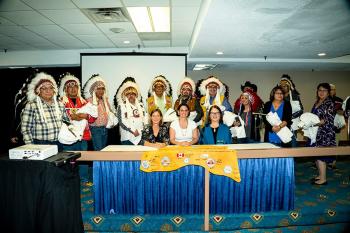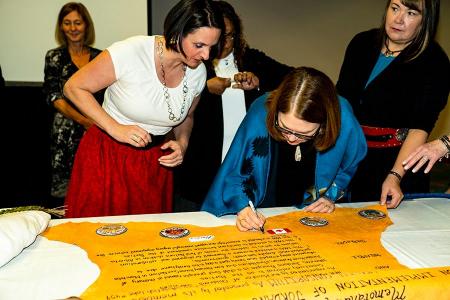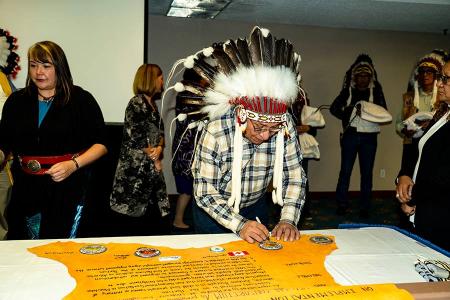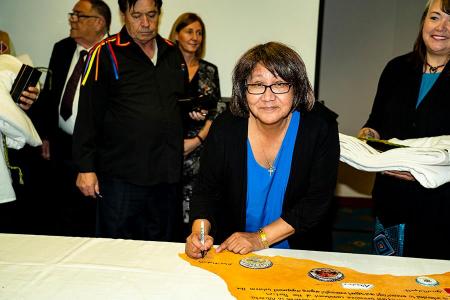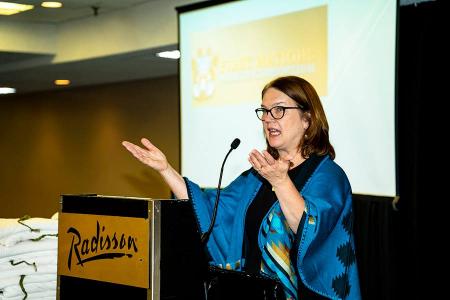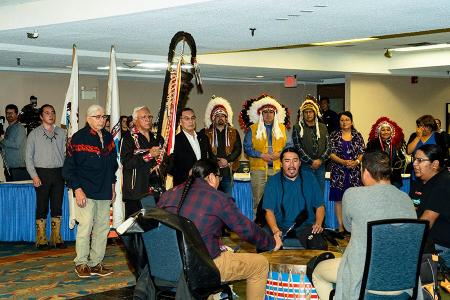Summary
The signing of the Jordan’s Principle memorandum of understanding Nov. 15 between three levels of government was particularly emotional for two women from the Siksika Nation.
Eleven years ago, Kathleen McHugh was chair of the women’s council for the Assembly of First Nations.
She recalls accompanying Jordan River Anderson’s family to the House of Commons on Dec. 12, 2007, when Jordan’s Principle legislation was passed.
It is only now that “something tangible” is happening, she said.
Jordan, a member of Norway House First Nation, died on Feb. 2, 2005 at the age of five. He lived more than two years in a hospital because neither the Manitoba government nor Ottawa could agree on who should pay for his at-home care.
Jordan’s Principle ensures that all First Nations children can access a wide range of health, social and educational products, services and supports when they need them, rather than waiting for governments to settle jurisdiction issues.
McHugh, who is now director of Siksika Disability Services, was at the ceremony on Thursday.
“It brings so much hope to us. Just watching the ceremonies and that gives it a lot more strength,” said McHugh, who is also the parent of a disabled child.
The MOU, signed by the federal and provincial governments and member nations of the First Nations Health Consortium, has as its guiding principle that no First Nations child, whether living on or off reserve, shall be denied care.
For Deanna Wolf Ear, her position as regional service coordinator with the First Nations Health Consortium (FNHC) is bitter sweet. Taken away from the Siksika Nation during the 60s scoop, her family told her she would someday return home and help her people.
“It’s exactly what we’re doing today. We’re standing up for our children,” said Wolf Ear.
The First Nations Health Consortium consists of 11 First Nations – the four nations of Maskwacis, the five nations of the Kee Tas Kee Now Tribal Council, Siksika Nation, and Bigstone Cree Nation – in all three treaty areas of the province and accounting for 30 per cent of the First Nations population.
The Jordan’s Principle MOU marks the first tripartite signing across the country.
However, Bigstone Chief Clara Moberly, representing the FNHC, said this MOU is not to be misunderstood as First Nations endorsing responsibility being handed from the federal government to the province.
“That’s not what this is all about. This is all about the service and implementation to help our children,” said Moberly.
Alberta Children’s Services Minister Danielle Larivee said it is important that Jordan’s Principle be undertaken in partnership with First Nations and be First Nations-led.
“This is about a process for all Indigenous children in the province to be able to access Jordan’s Principle. It’s a clear commitment on behalf of the province but also on behalf of the federal government, that it doesn’t matter where a child is born or where they’re living, but every child in Alberta deserves to have the services and supports they need in order to grow,” said Larivee.
She says she is not aware of any other First Nations looking to form health consortiums and signing similar tripartite MOUs.
“We’ll continue to have those nation-to-nation conversations with the nations in Alberta. It’s what we need to do to work together on behalf of their children,” said Larivee.
Jane Philpott, Indigenous Services Canada minister, said the Liberal government has put funding into Jordan’s Principle since 2016, something the Conservative government never did. Since then, 165,000 funding requests for “hundreds of millions of dollars” have been received and approved.
The federal government funded the FNHC $5 million in 2017 when it was formed. Philpott says First Nations in Alberta have received $30 million under Jordan’s Principle.
“We are really looking forward to opportunities to work in a trilateral way with all of the provinces … (but) we have been not waiting for that. We’re making sure the funding is there, making sure that children are getting access to the care they need in an affordable and efficient way and if there are more opportunities with the provinces to work with them, we would look forward to that,” said Philpott.

